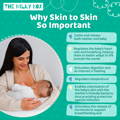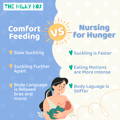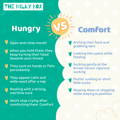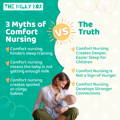When it comes to milk supply, there are a lot of mixed opinions. However, the consensus is that comfort feeding doesn’t increase your milk supply, at least not significantly. While it can stimulate the release of oxytocin, the latch is not quite right to trigger a response as big as regular breastfeeding does.
Embracing Comfort Nursing: A Guide to Its Practice
By: Dr. Maria Cerino - Updated May 14, 2024 - 11 Minute Read

You may have encountered the term "comfort nursing" during your breastfeeding journey. However, isn't nursing supposed to be comforting in itself?
Comfort nursing refers to the practice known as “comfort sucking”. Its purpose is not to feed or calm down hunger cries but to promote the tight-knit bond between baby and mom. It’s an experience of love, an expression of closeness that provides much-needed comfort for your baby.
In this article, we’re going to talk about comfort nursing. From the basics to myths, we’ve got you covered. Let’s begin!
Table of Contents:
1. Comfort Nursing: A Beautiful Bonding Experience
2. Soothing Breastfeeding
3. The Difference Between Comfort Nursing and Cluster Feeding
4. Comfort Nursing Can Help Breastfeeding Babies Fall Asleep
5. Comfort Nursing During Growth Spurts
6. The Myths of Comfort Nursing
7. Seeking Support from Lactation Consultants or Breastfeeding Support Groups
8. Introducing Alternative Soothing Methods
9. Weaning From Comfort Nursing
10. In Conclusion…
11. Frequently Asked Questions
Comfort Nursing: A Beautiful Bonding Experience
Comfort nursing has been around since the beginning of time. It is only natural that a baby seeks warmth and comfort from their mother. Skin-to-skin contact is, in fact, one of the most recommended practices after birth, it ensures the bond is well established between mom and baby.

It replaces the usage of a pacifier or the “cry it out” method. Instead, many mothers choose to comfort their babies by adopting the breastfeeding position and letting the baby suckle until sleep time comes. With this, the baby’s attention is switched to the mom’s scent, feel, heartbeat, and body heat. It makes them feel safe, therefore allowing them to fall into a sense of serenity and relaxation.
Both types of breastfeeding have been shown to provide a calming effect on babies. When babies receive frequent feedings, their circadian rhythm is regulated, and steadier sleeping patterns develop. Some parents seem to believe their babies’ improved quality of sleep has to do with their fullness, and while it does, it’s most times the closeness with the mom that enables better sleep.
Soothing Breastfeeding
There has been a lot of confusion in the past when it comes to comfort feeding for soothing, and traditional breastfeeding. Many believe they are interchangeable terms, but these two practices have very interesting qualities that make them different.
There are differences in how babies suckle depending on whether they are nursing for comfort or hunger. When a baby or toddler is nursing for comfort, their suckling motions are slower and spaced further apart. This is known as "flutter sucking." On the other hand, when a baby is nursing due to hunger, their suckling is usually faster and more intense.
You can also tell if the baby is hungry by their body language - they are typically stiffer, and their hands will reach up to find the breast.

The Difference Between Comfort Nursing and Cluster Feeding
Cluster feeding and comfort nursing can sometimes seem like they serve the same purpose. After all, it often is perceived as a baby who constantly latches onto the breast and suckles.
Cluster feeding happens when a baby demands to be fed back to back, almost without any breaks in between. This involves far more frequent feedings than your regular 2-3 hour feeding schedule. It happens more often during the first weeks of life, as the baby gets adjusted to digestion and milk production. Babies who cluster feed are ingesting a significant amount of milk during each feeding, contrary to comfort nursing.
It should last a few days at max and stop to be replaced by regular feedings. Keep in mind that these can also come in episodes. As they grow and adjust to the multiple stages of growth, you might notice other cluster-feeding episodes a few weeks after the first one.
Generally speaking, comfort nursing will last throughout the whole infant stage. They will seek closeness to their mom until they grow out of milk and start preferring solids. However, there are a few important cues to follow if you want to know if your baby is hungry or seeking comfort. We’ll discuss them in the next few paragraphs.
These Signs May Indicate That Your Baby is Hungry
These signs are generally easier to pick up, as they are instinctive for infants from the moment they’re born:
● Open and close mouth
● When you hold them, they keep turning their head towards your breast
● They suck on hands or fists persistently
● They appear calm and wide-eyed after a nap
● Rooting with a strong, nutritive suck
● Won’t stop crying after comforting them
They will usually stop displaying these signs as soon as they latch onto the breast or the bottle. After a few minutes of powerful sucking, hungry babies will gravitate towards sleep. A good burping session, and they’ll be ready for bed.
These Signs May Indicate That Your Baby is Seeking Comfort
During a feeding, babies sometimes will show some signs that they’re truly after comfort:
● Arching their back and grabbing ears
● Looking into space while feeding
● Sucking gently at the breast versus vigorous sucking
● Flutter sucking or short little sucks
● Slowing down or stopping while staying in position
Once these start appearing, you’ll also notice they’re not consuming any milk, but merely enjoying the comfort of being close to mom.

Comfort Nursing Can Help Breastfeeding Babies Fall Asleep
A study found that nocturnal breastfeeding is different from daytime feeding. Breast milk produced and delivered at night contains traceable melatonin levels, suggesting its delivery straight to the baby. This creates deeper, easier sleep for children, solidifying the theory that their circadian rhythms are regulated to be closer to how we function as adults.
This translates to comfort nursing, too, mainly because the baby feels safest when it’s closest to mom. The small spurts of milk they might be getting during comfort nursing help, but it’s mostly closeness and body heat from the mother that contribute to the baby’s relaxation. This same principle can be applied to all bottle-fed babies; holding them close as they fall asleep will imitate this effect.
Comfort Nursing During Growth Spurts
When infants grow, they sometimes require extra love and support. Some moms also experience an increase in milk production. This is normal. It will satisfy their need for assurance and safety and further solidify the bond between the two of you.
The Myths of Comfort Nursing
There are a lot of myths surrounding comfort nursing. Many believe this practice will “ruin” their baby’s behavior as they grow, or their entire sleep schedule will be a wreck if they rely on it. Luckily, all those myths can be quickly dispelled, and we’d like to present you with the facts so you can feel calm about comforting your baby at home.
Comfort Nursing Hinders Sleep Training
Due to its relaxing nature, sleep training primarily relies on providing comfort through a warm, safe environment. Babies learn to self-soothe first, then fall asleep on their own. Drowsiness comes naturally to them. No evidence suggests that comfort nursing hinders sleep training. It can promote easier sleep when used at the right time.
Comfort Nursing Means the Baby is Not Getting Enough Milk
This misconception is extremely common, but not the most common. If your baby is nursing normally and is not displaying any signs of hunger, you don’t need to worry about this. The signs and your infant’s intentions regarding comfort nursing are different.
Keeping your baby’s weight gain in check as they grow is vital. If you notice your baby isn’t gaining weight or reaching their developmental milestones, it might need some investigating, so it’s essential to consult your medical provider as soon as you notice something is off.
Comfort Nursing Creates Spoiled or Clingy Babies
A lot of parents believe comfort nursing will make their baby extremely dependent on their mother. This is untrue and isn’t backed up by any research, so you can be at ease when providing comfort. Moreover, it will only strengthen your connection with your baby and help them develop stronger connections with loved ones as they age.

Seeking Support from Lactation Consultants or Breastfeeding Support Groups
If you notice your baby shows signs of hunger even right after a feeding, struggles to fall asleep due to hunger, or suffers from blisters and painful feedings, you might need extra support. Lactation consultants are a great way to evaluate feeding sessions and get feedback. They can also help you identify any underlying issues.
However, if your baby is not growing or gaining weight, you need to consult your doctor or qualified holistic practitioner immediately, as they might need extra supplementation depending on their condition.
Introducing Alternative Soothing Methods
Once your baby starts preferring solids to milk, you will notice them moving away from comfort feeding. This is nothing to worry about; you don’t need to worry about your bond.
The strong bond you’ve created with your baby will last a lifetime. They will seek your comfort and support throughout different stages of their lives.
Weaning From Comfort Nursing
A good way to help your little ones feel supported as they age is to introduce alternative soothing methods such as rocking them, singing a lullaby, or massaging their backs or tummies. These are all great ways to show them your love as they transition.
Older kids will require more conventional displays of affection and soothing, such as hugs and words of affirmation. They are as important as comfort nursing and will only strengthen your bond over time.
Seeking additional support can make the process easier and less stressful. Lactation consultants specialize in helping mothers with breastfeeding and can provide valuable guidance and support during the weaning process. They can help you develop a weaning plan that suits your needs and circumstances.
Breastfeeding support groups are also an excellent resource for mothers who are weaning. These groups bring together mothers going through similar experiences and can provide a supportive environment to share tips, advice, and encouragement. By seeking out these sources of extra support, you can make the weaning process smoother and more successful.

Breastfeeding Support
We completely understand the challenges that come with breastfeeding. Please know that it's completely normal to take some time to get used to it, and every struggle and discomfort can teach you something new for the next time.
If you are experiencing any difficulties with breastfeeding, we are here for you. Our team of medical professionals has written and reviewed articles specifically on breastfeeding, and we are confident that we can help you find the solutions you need.
For more breastfeeding support, we invite you to explore these incredible resources! They are designed to empower you with knowledge and options.
★ Can Lactation Cookies Enhance Milk Production?
★ Melatonin for babies? Unbelievable Breastfeeding Facts
★ Comfortable Breastfeeding Positions for You and Your Baby
The MilkyBox Team is also an excellent resource for information about European baby formulas. These formulas are specially created to mimic breastfeeding and can be used as a supplement or alternative when needed, giving you more choices and control over your feeding journey.
Our friendly and knowledgeable support team is always available to provide expert assistance.

In Conclusion…
Comfort feeding is, if anything, the first and most natural source of bonding with the mother. Newborns require closeness with their mom, and a big part of this comes from breastfeeding. They start to recognize the mom’s scent, heartbeat, and warmth before they’re able to take their surroundings in fully.
While there are multiple myths surrounding comfort feeding, the truth is that there is nothing inherently negative about it. Babies naturally grow out of it as they learn to self-soothe, relax, and fall asleep at their appropriate time. Nutrition is not impacted by comfort feeding, as they don’t ingest a significant amount of milk during these sessions. As long as they are breastfeeding, they should be perfectly fine with their regularly scheduled feedings.
The Milky Box offers comprehensive support to parents, from infants to toddlers and children up to three. Our goal is to be an excellent resource for parents who want to provide the best care for their little ones while ensuring their convenience and peace of mind.
Frequently Asked Questions
Is comfort feeding increasing my milk supply?
Will bottle-feed babies need comfort nursing?
Yes and no. Their nutritional needs will not suffer if fed a high-quality, age-appropriate formula, but many parents worry about bonding with moms. It is suggested to make the most of bottle time to promote skin-to-skin contact and closeness so the baby can enjoy the same benefits. It doesn’t hurt to carry them and hold them close to your chest while talking softly when they’re upset.
When should I stop comfort nursing?
The great thing about comfort nursing is that babies wean themselves off it as they age. When they start relying on solid foods, being social, and interacting with elements in their surroundings, they start finding alternative sources of self-soothing. Getting their infants to stop comfort nursing is rarely an issue for moms.
Do I need to burp my baby after comfort nursing?
This is going to depend on your baby’s stance after comfort nursing. If you don’t notice any signs of extra fullness or irritability, you might need to burp them. Otherwise, they should be okay if they fall asleep after a comfort nursing session.
Is there any reason I should stop comfort nursing early?
Not really. Usually, babies will grow out of comfort nursing as they reach the toddler stage. Comfort nursing should only be stopped if your baby comfort feeds every time they latch and stops feeding altogether, if they’re not gaining weight accordingly, or if it displays any regression in its growth or developmental milestones.
Disclaimer:
Please be aware that this information is based on general trends in babies, and it is not medical advice. Your doctor should be your first source of information and advice when considering any changes to your child’s formula and when choosing your child’s formula. Always consult your pediatrician before making any decisions about your child’s diet or if you notice any changes in your child.
Breastfeeding is the best nutrition for your baby because breast milk provides your child with all the essential nutrients they need for growth and development. Please consult your pediatrician if your child requires supplemental feeding.

Dr. Maria Cerino is a medical doctor and a researcher from Mexico, her works being published in prestigious journals like the American Journal of Human Biology among others. As a medical writer, Dr. Cerino focuses on infant nutrition and healthy neurological development in infants and children. In her free time, she enjoys going on walks, watching indie films, and cooking at home.
Read Next:
Reviewed by Dr. Eric Wood, ND, MA

Dr. Wood is a licensed naturopathic doctor, with a doctorate degree from the Canadian College of Naturopathic Medicine in Toronto, Canada. He received his post-graduation certification in Mind Body Medicine at Harvard University.
With 15 years of experience, Dr. Wood is an Associate Professor of Holistic Nutrition at the American College of Health Sciences in Portland, Oregon. Dr. Wood is an educator, clinician, author, media figure, consultant, and owns his own holistic (naturopathic) medical practice in Ft. Lauderdale, Florida. Dr. Wood is currently researching and drafting books on cancer and pediatrics.
Outside of the medical profession, Dr. Wood loves singing with the Miami Lyric Opera and is an avid musician in South Florida. He also loves spending time with his wife and kids.

